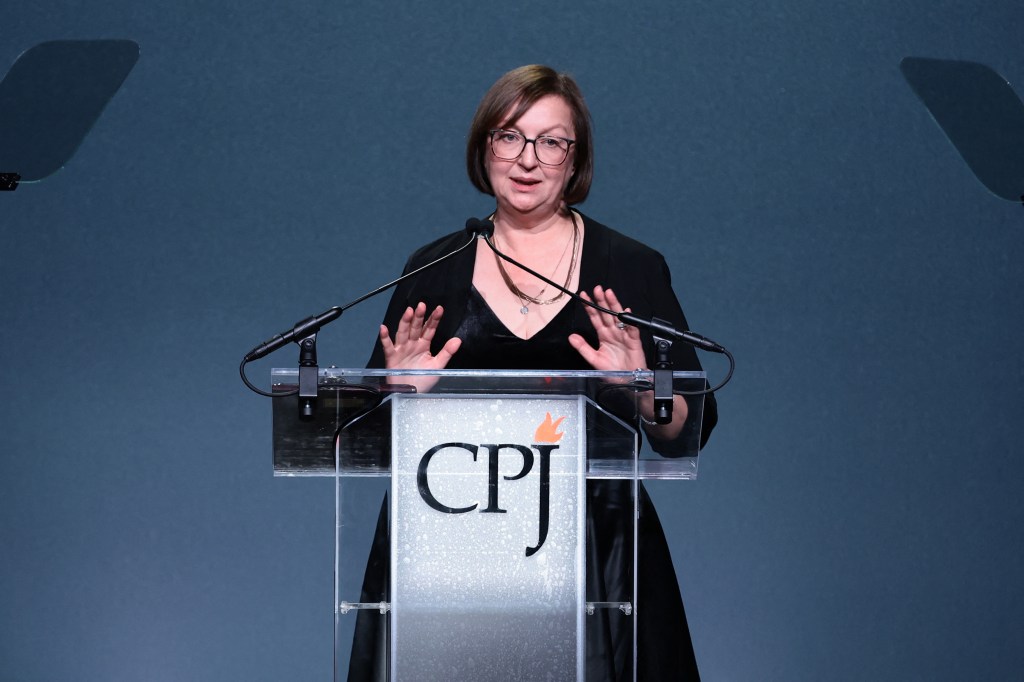Berlin, May 30, 2024—Russian authorities must end the prosecution and harassment of journalists connected with the Latvia-based independent news site Meduza and those who share its content, the Committee to Protect Journalists said Thursday.
On May 2, the Cheryomushki district court in the Russian capital Moscow initiated administrative proceedings against Galina Timchenko, head of Meduza, on charges of participating in the activities of an “undesirable organization,” according to news reports and Timchenko, who spoke to CPJ from exile.
On January 26, 2023, the Russian prosecutor general’s office declared Meduza “undesirable” effectively banning it and stating that its activities “pose a threat to the foundations of the Russian Federation’s constitutional order and national security.”
On May 17, a magistrate’s court in Moscow initiated identical administrative proceedings against Meduza’s exiled correspondent and investigative journalist Svetlana Reiter, according to media reports.
On May 21, the Leninsky district court of the Russian-occupied capital Sevastopol in Ukraine’s Crimea fined exiled Meduza journalist Anastasiya Zhvik 10,000 rubles (USD$111) under Article 20.33 of the Administrative Code for participating in an “undesirable organization”, according to news reports.
On May 23, the Yakutsk city court in Russia’s Siberia fined journalist Vitaliy Obedin for his association with an “undesirable organization” after Obedin shared a Meduza article on his personal Telegram channel “BO!-kanal,” according to news reports and Obedin, who spoke to CPJ.
“The persistent prosecution of exiled independent media and journalists demonstrates how afraid Russian authorities are of critical reporting,” said Gulnoza Said, CPJ Europe and Central Asia program coordinator, in New York. “Meduza head Galina Timchenko and Russian journalists who continue covering Russia from exile are providing a vital service for the Russian public, which deserves to have access to truthful information beyond the propaganda that pervades the country’s state-owned media outlets.”
Founded and operating from Latvia, Meduza was the first independent media outlet to be designated a foreign agent by Russian authorities, and its site was blocked inside the country during the first week of Russia’s full-scale invasion of Ukraine, Timchenko told CPJ. She said the court decision was not unexpected.
“Cases have already been brought against my journalists,” said Timchenko, who is also CPJ’s 2022 Gwen Ifill International Press Freedom Award recipient.
In the first four months of 2024, Russian courts received 19 cases involving independent media outlets that the prosecutor general’s office had classified as undesirable, according to independent news outlet Mediazona. At least three of these cases targeted Meduza journalists, including Reiter, Zhvik, and frequent contributor Dmitry Kuznets.
A hearing is scheduled for Reiter’s case on June 4, according to reports. If convicted, she could face a fine up to 15,000 rubles (US$169) as a first-time offender, according to Article 20.33 of the Russian administrative code.
On April 25, the Nikulinsky district court in Moscow fined Kuznets 10,000 rubles (US$113) for participating in the activities of an “undesirable organization” because of his involvement in “What Happened?” podcast. On April 23, a similar charge was brought against Zhvik in the Leninsky district court of Crimea.
On December 23, 2022, Zhvik was designated as a “foreign agent.” Additionally, in 2022 and 2023, she was fined twice under Article 20.3.3 Part 1 of the Administrative Code for discrediting the Russian army due to her anti-war posts on Instagram.
“Waiting is a rather heavy feeling,” said Timchenko. “Their next step will be a criminal case against me and a wanted notice, since I’m not going to leave Meduza.” A court hearing for Timchenko has yet to be scheduled.
According to the Russian Criminal Code, law enforcement can initiate criminal proceedings under Article 284.1for individuals who have previously faced administrative penalties within a year for repeated “participation” in the activities of an “undesirable organization.”
Obedin told CPJ that he faces eight separate administrative cases in connection with his reposting of Meduza articles on his Telegram channel in 2020 and 2021. The court found him guilty in four cases, imposing a fine of 5,000 rubles (US$56) for each case, and a hearing on the remaining four is scheduled for June 3, he told CPJ. The Russian prosecutor general’s office declared Meduza’s activities “undesirable” in January 2023.
Obedin said that he intends to contest these rulings through an appeals process after Aleksandr Khinstein, the chairman of the Russian State Duma’s information policy committee, said that those who previously shared materials from Meduza will not be subject to fines following its designation as undesirable.
Organizations that receive an “undesirable” classification are banned from operating in Russia, and anyone who participates in them or helps organize their activities faces up to six years of imprisonment and administrative fines. The designation also makes it a crime to distribute the outlet’s content, such as sharing it online, or to donate to it.
CPJ emailed requests for comment to the Yakutsk city court and Moscow’s Cheryomushki district court but did not receive any replies.
Editor’s note: The photo credits of this alert have been updated.
